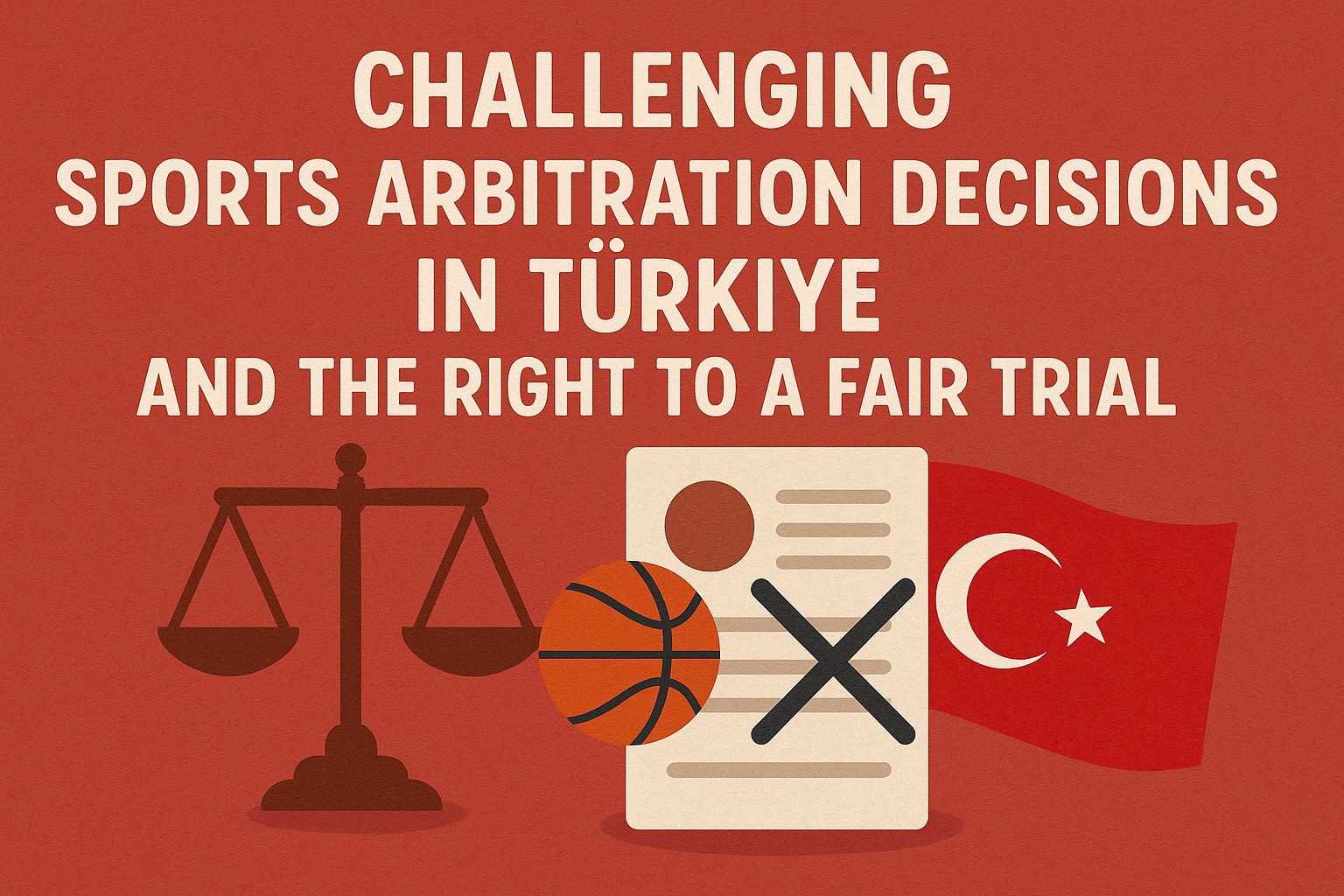CHALLENGING SPORTS ARBITRATION DECISIONS IN TÜRKİYE AND THE RIGHT TO A FAIR TRIAL

Introduction
In Türkiye, disputes arising from sports federations are resolved through arbitration boards either under the Ministry of Youth and Sports or, in football, through the Turkish Football Federation (Türkiye Futbol Federasyonu) (TFF).
Since the 2011 amendment of Article 59 of the Turkish Constitution, decisions of these boards in disciplinary and administrative matters are final and not subject to judicial review.
Whilst this system aims at efficiency, it raises serious concerns under Article 6 of the European Convention on Human Rights (ECHR), which guarantees a fair hearing before an independent and impartial tribunal.
The Turkish Framework
Sports federations function with administrative autonomy but remain under ministerial oversight. Disciplinary sanctions and eligibility decisions are channelled exclusively to arbitration boards, whose rulings are not open to appeal.
The Turkish Constitutional Court has recognised that contractual and commercial disputes may remain justiciable before ordinary courts, but, in disciplinary cases, the judicial route is constitutionally closed. This leaves athletes and referees without any external legal mechanism to test the fairness of the arbitral body concerned.
Fair Trial Standards and Compulsory Arbitration
Article 6 applies when “civil rights and obligations” are determined, a category that includes sporting bans, loss of income, and professional status. The European Court of Human Rights (ECtHR) in Strasbourg, France, has drawn a distinction between voluntary arbitration, where parties waive certain rights, and compulsory arbitration, where no such waiver is possible. In Suda v. Czech Republic (2010) and later in Mutu and Pechstein v. Switzerland (2018), the ECtHR made clear that, in compulsory settings, arbitration must provide all Article 6 guarantees.
The difficulty in Türkiye is that arbitration boards are structurally linked to sports federations or the Ministry of Youth and Sports.
In Ali Rıza and Others v. Turkey (2020), the ECtHR found that the TFF Arbitration Committee lacked independence and impartiality: its members were appointed by the federation’s executive; had no security of tenure; and were not subject to impartiality safeguards. Because decisions were final and not reviewable, the TFF Arbitration Committee itself had to comply fully with Article 6 — which it did not. The Managing Partner of our Law Firm, Dr Lucien Valloni, successfully represented Ali Riza in this important case before the ECtHR.
Consistent Strasbourg Jurisprudence
The ECtHR has reinforced this approach in subsequent Turkish cases. In Naki and Amed SK v. Turkey, Sedat Doğan v. Turkey, and Tokmak v. Turkey (2021). The ECtHR again ruled that the TFF Arbitration Committee did not satisfy the independence and impartiality requirement, adding that sanctions on athletes for their statements also breached Article 10 on their freedom of expression. These judgments highlight that a systemic flaw exists in Turkish sports justice: the absence of any independent review mechanism combined with structurally dependent arbitral bodies.
Internationally, the ECtHR has acknowledged that arbitration in sport can meet fair-trial standards where adequate review exists. For example, in Mutu and Pechstein, whilst finding a violation regarding the lack of a public hearing, the ECtHR accepted that the Court of Arbitration for Sport in Lausanne, Switzerland, could be considered an independent tribunal, partly because its Awards are reviewable by the Swiss Federal Supreme Court. By contrast, the system in Türkiye lacks any such corrective level (instance).
Access to the ECtHR
Athletes in Turkey must first lodge an individual constitutional complaint alleging violation of fair-trial rights. If unsuccessful, they may apply to Strasbourg within four months. The ECtHR has consistently admitted such applications, stressing that lack of compulsory arbitration independent oversight cannot deprive individuals of their Article 6 rights. Given the precedent of Ali Rıza and related cases, new applications are strongly arguable.
Conclusion
The Turkish constitutional framework deliberately excludes judicial oversight of sports arbitration, but this exclusion conflicts with the ECHR demand for fairness. The ECtHR jurisprudence — Mutu and Pechstein v. Switzerland (2018), Ali Rıza and Others v. Turkey (2020), and Naki and Others v. Turkey (2021) — confirms that, without independence or review, there is no fair trial.
Until Türkiye reforms its system, either by establishing a genuinely independent arbitral body or permitting limited court review, athletes will continue to find their rights vindicated in Strasbourg.
For further information and advice on challenging sports arbitration decisions in Türkiye, email the Head of our Turkish Law Practice, Att. Gurur Gaye Günal, at gunal@valloni.ch.